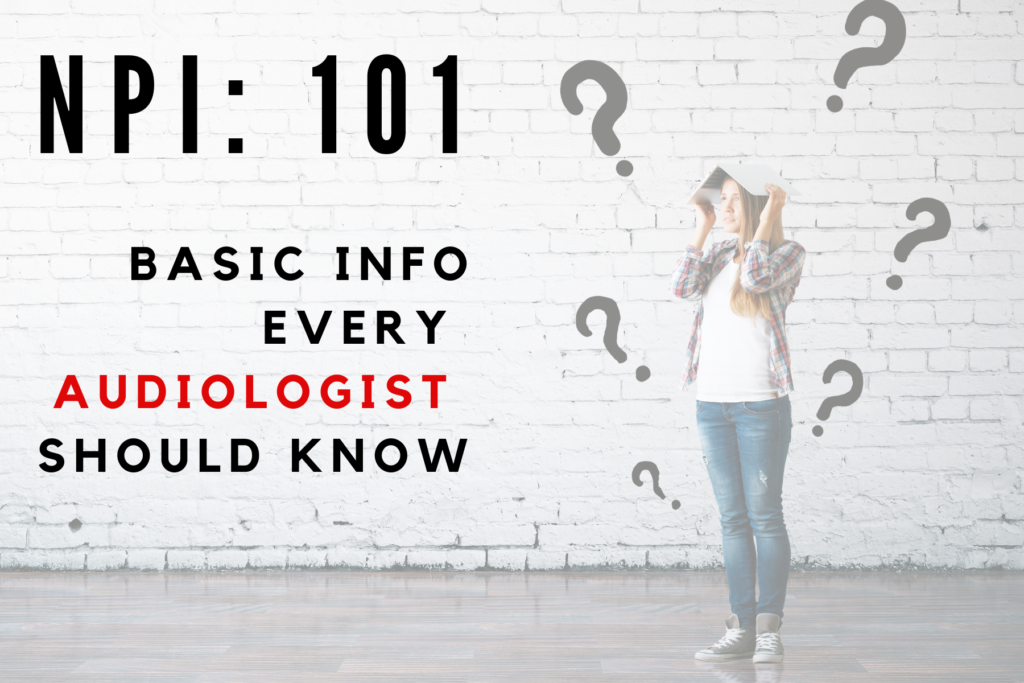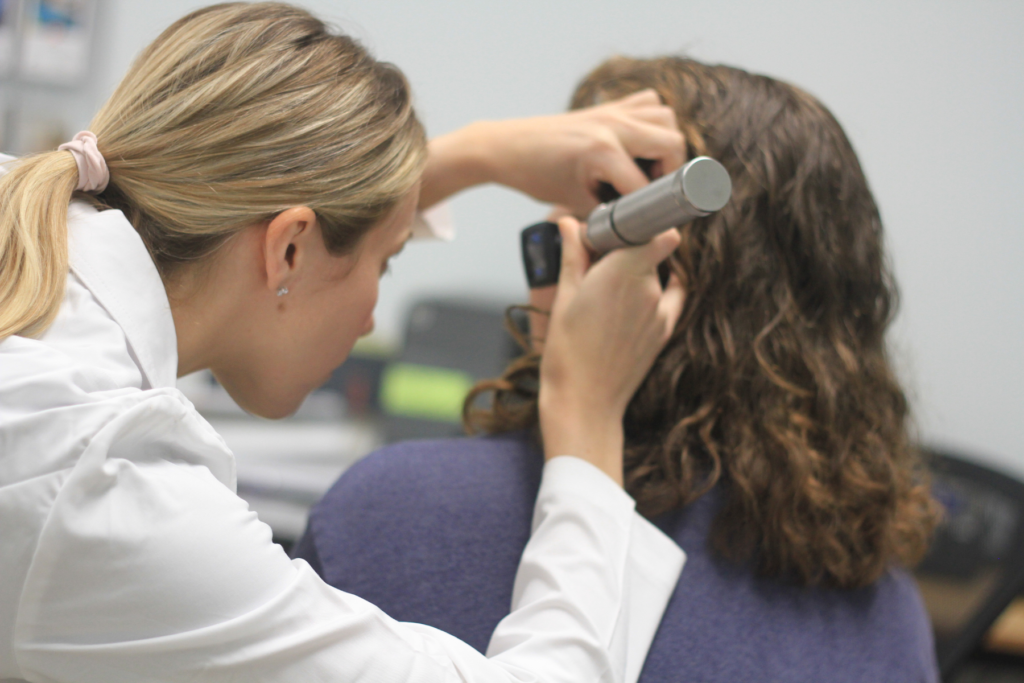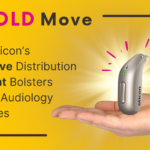
Author: Kellye St Claire, MHA
October 17, 2024
NPI 101: The Basics Every Audiologist Needs to Know
While you're here, check out...
-
NPI Structure for Multi-Location Audiology Clinics
February 3, 2025 -
Medicare & Audiology Questions Answered
October 7, 2024 -
Skating Too Close
May 29, 2024 -
Oticon Chooses Value Over Volume
April 29, 2024
Not Sure If You Have an NPI?
Search for your NPI number on the NPPES NPI Registry.
Securing an NPI, or National Provider Identifier, is a small but essential step in establishing yourself as a professional audiologist. Though often overshadowed by billing codes and insurance filings, the NPI plays a critical role in healthcare identity management and patient data protection.
An NPI makes you visible in national healthcare directories, simplifying processes for insurance claims, referrals, and even protecting your professional reputation.
So, how does it work, and what do you need to know to ensure your NPI is properly managed? Let’s dive in and learn the basics every audiologist needs to know!
What is an NPI?
The National Provider Identifier, or NPI, is a unique, 10-digit number required by HIPAA for healthcare providers, including audiologists. Managed by the Centers for Medicare & Medicaid Services (CMS), an NPI identifies you as a recognized provider across all health plans and healthcare interactions in the U.S.
This number ensures:
- Consistency in healthcare billing
- Patient referrals
- Electronic health records (EHR) systems.
In audiology, an NPI is essential, whether you’re running an independent practice or working within a larger healthcare system. It assures patients, insurance companies, and referring providers that you’re qualified and vetted to provide audiological care.
Why Do Audiologists Need an NPI?
For audiologists, having an NPI number isn’t just a good practice—it’s legally required for most billing and claims processes.
Here are some key reasons why it’s critical for audiologists:
- Insurance Billing: Whether you’re billing Medicare, Medicaid, or private insurers, the NPI is central to claim processing.
- Provider Verification: NPIs allow insurers and patients to quickly verify your status and credentials, reducing delays in claims and care delivery.
- Patient Referrals: Providers referring patients to you can easily find your NPI, making the referral process smooth and ensuring continuity of care.
- Healthcare System Integration: With your NPI on record, EHRs can accurately link you with patient interactions, prescriptions, and diagnostic reports across systems.
What is the Difference Between Type 1 and Type 2 Entity NPI?
Type 1: Individual
- Who It’s For: Type 1 NPIs are assigned to individual healthcare providers, including audiologists, physicians, nurse practitioners, and any licensed individual providing healthcare services.
- Uses: This is used for individual billing, claims, and patient records. Even if an individual practitioner works within a larger organization, they will still need a Type 1 NPI for their personal practice and claims-related activities.
- Uniqueness: A Type 1 NPI is unique to each provider, and each provider has only one Type 1 NPI that they keep for life, regardless of location or employer changes.
Type 2: Organization
- Who It’s For: Type 2 NPIs are designated for healthcare organizations, such as group practices, clinics, hospitals, and audiology practices that bill as an entity rather than as an individual.
- Uses: Type 2 NPIs are used when the organization itself is the billing entity. This means that services billed under a Type 2 NPI come from the organization, regardless of which individual provider within the organization provided the service.
- Uniqueness: Organizations can have multiple Type 2 NPIs if they operate under different business entities or tax identification numbers. For example, a hospital system with multiple locations or departments may have a unique Type 2 NPI for each location or department for billing purposes.
How Should an Audiologist Apply for an NPI?
Here’s a step-by-step guide for Audiologists:
- Create an Identity & Access Management System user account.
- Apply for NPI in NPPES.
- Enroll in PECOS.
- Submit Your Application: Once the form is completed and double-checked for accuracy, submit it. You should receive your NPI within 10 business days.
Prefer the paper application? Click Here.

NPI Maintenance: Keeping Your Information Current
Keeping your NPI information up-to-date is essential for compliance and smooth operations.
For audiologists, failing to update your NPI can lead to delayed claims, referral issues, and even regulatory trouble.
Here’s how to stay on top of it:
- Update for Address Changes: Whether you’re moving to a new practice or updating your clinic’s address, changes should be updated in NPPES within 30 days.
- Keep Contact Information Accurate: Make sure phone numbers and email addresses in your NPI record are current to avoid communication delays.
- Verify Your Specialty: If your practice focus changes, update your NPI record to reflect this. While it’s rare in audiology, an accurate specialty classification can influence insurance handling and referrals.
- Renewal and Verification: Although an NPI doesn’t expire, regular verifications with NPPES help ensure your information is always accurate.

Common NPI Questions for Audiologists
1. Can I have more than one NPI?
- Generally, providers only need one NPI. However, if you operate under multiple entities, like an individual NPI and an organization NPI for a clinic, you might have more than one.
2. What if I change specialties within audiology?
- Update your NPI to reflect any significant changes in specialty, as it could affect your billing codes or insurance processes.
3. Does my NPI expire?
- No, your NPI is a lifelong identifier unless you’re sanctioned or removed from practice.
4. Is my NPI protected?
- While NPI numbers are public to support provider identification, they are protected under HIPAA in the context of patient and billing data. Use your NPI only within secure platforms or encrypted communications for healthcare transactions.
Final Thoughts on NPI and Compliance
As an audiologist, your NPI is essential in managing patient care and maintaining a streamlined practice. From accurate claims processing to trusted referrals, this unique identifier is a small but mighty component of healthcare administration.
Set aside time to ensure it’s accurately maintained, and you’ll avoid the pitfalls that come with outdated or incorrect provider information.
Remember, staying current on your NPI details isn’t just about compliance—it’s about efficiency, professionalism, and, ultimately, providing the best care to your patients.

Sources
FEDERAL REGISTER
Department of Health and Human Services

Recent Posts

Medicare Regulations for Audiologists
Medicare rules for audiologists can be confusing, especially when it comes to enrollment, provider participation, mandatory claims submission, and billing compliance. Can audiologists opt out of Medicare? Do they have to file claims for every covered service? This blog debunks common Medicare myths and clarifies key regulations using official Medicare Benefit Policy Manual references and AI-powered analysis to ensure accuracy. Stay compliant, avoid billing mistakes, and navigate Medicare regulations with confidence.

NPI Structure for Multi-Location Audiology Clinics
NPI Structure for Multi-Location Audiology Clinics By: Kellye St Claire, MHA While you’re here, check out… NPI 101: Everything Audiologists Need to Know October 18,

Medicare & Audiology Questions Answered
As audiologists navigate Medicare’s complex compliance requirements, understanding key regulations—like mandatory claim submission and limits on opting out—is essential. For those considering selling a practice to a manufacturer, compliance risks only increase, with potential consequences such as financial penalties, loss of licensure, or exclusion from Medicare. This post breaks down crucial Medicare guidelines, highlights the importance of maintaining compliance, and explains why investing in legal consultation can protect both your practice and professional future.





